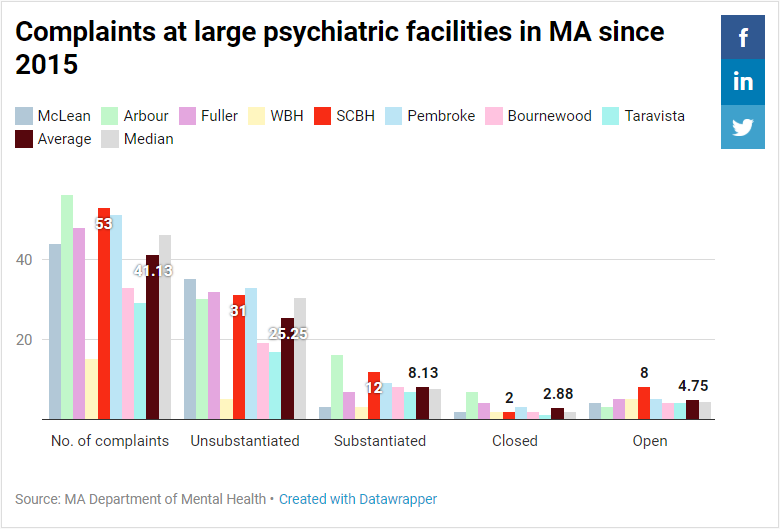Faunce Corner psychiatric facility second in state for complaints
An unusually high number of complaints filed with the state against a Dartmouth psychiatric hospital built in 2015 includes a laundry list of allegations, such as withholding medication, lack of communication with family and external doctors, and discharging patients without confirming with caregivers.
South Coast Behavioral Health (SCBH) on Faunce Corner Road holds the second-highest number of official complaints out of similar psychiatric facilities in Massachusetts.
But according to the hospital, nearly 79 percent of patients said they were satisfied with their care in an independent survey.
In a written statement, SCBH CEO Felicia Risick noted that the people treated at the hospital are extremely vulnerable and their treatment poses many unique challenges. “We have a robust complaint process,” she stated.
The facility is a 144-bed psychiatric hospital run in a partnership between the not-for-profit Southcoast Health and specialty behavioral care provider Acadia Healthcare, with an additional adolescent unit and a newly opened dual diagnosis unit not included in this story.
Acadia Healthcare runs the day-to-day operations of the hospital.
By the numbers
Data obtained by Dartmouth Week from the state’s Departments of Mental Health and Public Health shows that at least 53 official complaints were filed against the facility from 2015 until mid-2019.
This is the second-highest number of complaints out of eight other psychiatric hospitals with more than 100 beds in the Commonwealth.
South Coast Behavioral is second only to Arbour Hospital in Boston’s Jamaica Plain neighborhood, which had 56 complaints filed in the same period.
Both are well above the average of 41 complaints filed since 2015 among these facilities.
Of the South Coast Behavioral complaints, 12 were substantiated following an investigation by the Department of Mental Health, meaning that a violation of some kind was found to have occurred.
The number of substantiated complaints is also the second-highest among similar facilities in Massachusetts.
31 complaints — or more than half of those filed — were labeled as “unsubstantiated”, meaning either no violation occurred or not enough evidence was found.
This ratio is just below average, meaning there were fewer “unsubstantiated” complaints at SCBH than at comparable hospitals.

Allegations
A few consistent allegations repeatedly crop up in different complaints filed with the state’s Department of Public Health.
Among these are lack of communication with families and external doctors, and confusion around the discharge process.
Patients and their families have described feeling as if they were “under duress” due to the behavior of staff at the hospital on at least two occasions resulting in complaints.
One patient alleged in a complaint filed in 2016 that the admitting doctor “threatened if I didn’t sign myself in he would commit me for six months.”
“I told him I was under duress,” she stated.
Risick stated that “Under no circumstances do we force a patient to sign-in, though as part of treatment, we do encourage patients to take an active role in their care, which includes signing in voluntarily.”
She went on to note that more than 95 percent of patients come to the hospital involuntarily. As for forcing patients to stay, Risick added, “Only a judge can make that decision.”
According to the same complaint, the doctor prescribed medication without consulting with the patient’s private physician. “He would not return [the physician’s] calls,” the complaint stated.
Upon discharge, the patient alleged she found out the medication was for conditions that she did not have.
“My doctor of twenty years gave me different meds upon seeing her after release and told me not to take the meds he prescribed,” the complaint alleged.
“The treatment team always makes every attempt to get as much collateral information as possible,” noted Risick. “That being said, there must be a release of information to speak with any outside party.”
Another complainant detailed issues with the discharge process for her elderly mother, who was a short-term patient at the facility.
She alleged that she was given less than 24 hours’ notice to accept a bed at a long-term nursing home and — without having had time to check up on the new facility — was told that if she didn’t accept, she would be charged $1800 per day for her mother’s bed at South Coast Behavioral.
“This may have been an obligated duty but it was also perceived as a threat,” she alleges in the complaint. “It was at this point it became clear that the care and compassion I’d felt had been provided by South Coast came with limits and a price tag.”
In the complaint she described rushing to check up on the new facility “under duress” — and in the meantime, her mother arrived from South Coast Behavioral.
“I could not believe that a care facility of any sort would put my Mother in a vehicle and send her somewhere with no confirmed acceptance by me, her daughter and the responsible caregiver,” the complaint reads. “Where does one send a Behavioral Center with behavioral issues?”
Risick stated, “Occasionally, if a patient is going to a long-term care facility, it can at times be “last minute,” as we are often on waiting lists due to the paucity of resources. We make every attempt to notify those involved as early as possible when permittable.”
Addressing complaints
It is currently unclear how the specific complaints outlined in this article were dealt with because they were sent from the state’s Department of Public Health to the Department of Mental Health.
The Department of Mental Health stated in response to a records request that “After a comprehensive search, DMH has not identified any records responsive to your [request] in its possession, custody, or control.”
However, Misael Garcia, Secondary Records Access Officer at the Department of Mental Health, noted that all official complaints have been or are currently being investigated by the department.
If a complaint is substantiated, how it is dealt with depends on the nature of the complaint.
“There is no one-size-fits-all approach,” Garcia said.
In some cases, the complaint is redirected to another agency or law enforcement, or the complaint is withdrawn.
In others, the complaint is determined to be unsubstantiated and will not be investigated further unless the decision is appealed.
Garcia stated that all complainants have a right to appeal the decision if they disagree with the results of the investigation.
Director of Business Development at South Coast Behavioral Health Katlyn Auty released a statement noting that the facility “performs above the national average on multiple independently administered, evidence-based clinical quality performance benchmarking programs.”
The statement added that according to an independent survey conducted over 13 months by PressGaney, “Nearly 79 percent of patients described their overall satisfaction as Very Good or Good”.
75 percent of patients stated that they would “strongly recommend” the facility, according to the survey results, and 84 percent said that their condition “strongly improved.”
“Many of the patients we treat are extremely ill and our facilities, like other behavioral health facilities, provide something to the community that historically and presently, many have turned their backs on,” noted Risick. “Southcoast Behavioral Health participates in many community and charity events to help raise awareness about mental illness...We are always looking for ways to give back and share our expertise.”













